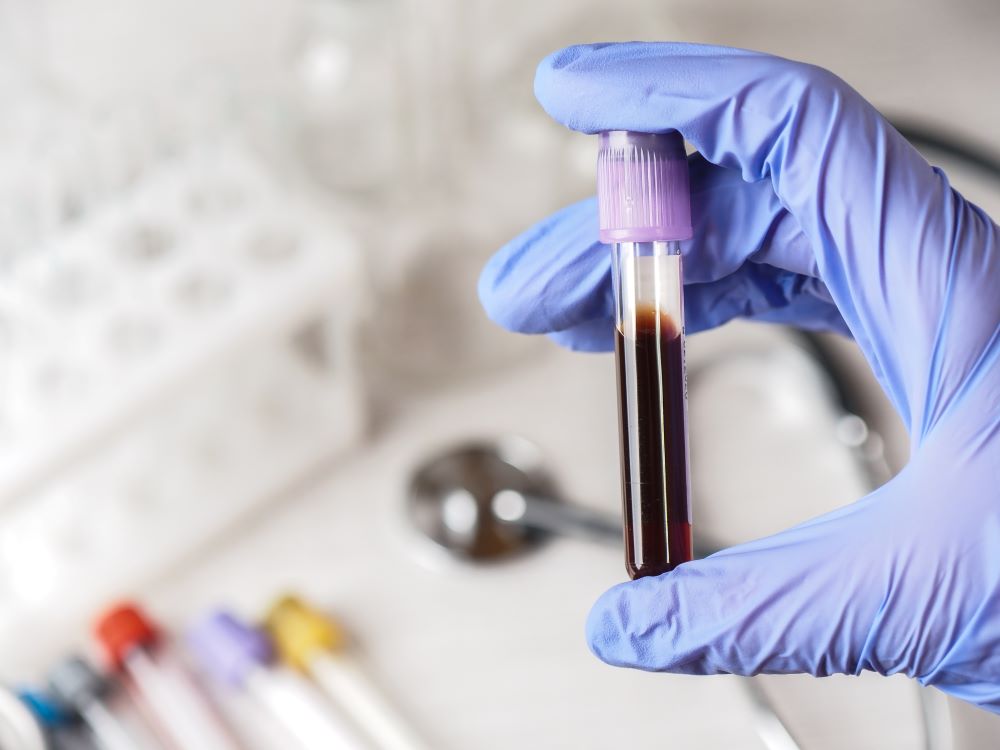What is SGOT (Serum Glutamic Oxaloacetic Transaminase) in a Blood Test?

SGOT (Serum Glutamic Oxaloacetic Transaminase) blood test is also known as the AST (Aspartate Aminotransferase) test. This test determines the level of AST in the blood to check whether the liver is functioning well or not. Further, the result derived from this test reveals the severity of one’s condition based on the enzymes in the blood.
Continue reading this piece to learn what this SGOT test means. This will take you through the test results' significance, process, and consequences.

Table of Contents

What is an SGOT Blood Test?
Also known as the Aspartate Aminotransferase (AST) test, the SGOT blood test shows the amount of the enzyme SGOT in the blood. The liver, heart, muscles, and other tissues contain most of this enzyme.
Raised levels of SGOT may be a sign that your liver is failing, you have heart disease, or you have some other medical condition. It is a common way of assessing liver health.
What Does SGOT Blood Test Determine?
The SGOT blood test is a liver profile that evaluates the quantity of serum glutamic oxaloacetic transaminase present in one’s blood. These levels fluctuate when a damaged liver cell releases the enzyme in the blood.
Furthermore, high AST levels may indicate liver damage and other organs that make this enzyme. This AST enzyme is primarily found in the liver and is also present in other body parts, such as –
- Heart
- Kidney
- Muscles
Why is an SGOT Test Necessary?
To get a clearer picture of why the SGOT test might be ordered, it helps to know what it’s used for. The uses of the SGOT test are as follows:
- Doctors use an SGOT test to diagnose liver problems or the degree of liver disease. Liver damage increases the amount of SGOT in your blood.
- People with hepatitis C and other liver conditions may get a more accurate evaluation of liver health using this blood test.
- Your serum glutamic-oxaloacetic transaminase levels are measured when your doctor suspects that you’ve had a heart attack or muscle injury.
- This SGOT test gives an overview of how well your liver is functioning. It's a blood test that measures one of the two main liver enzymes, SGOT, which is found in the highest concentrations in the liver.
When Should I Get the SGOT Test?

A doctor may order blood test when an individual develops symptoms of liver damage such as –
- Jaundice with yellow eyes or skin
- Light-coloured poop
- Weakness
- Dark-coloured urine
- Swollen belly
- Tiredness
- Stomach pain
- Appetite loss
- Bruises
- Itchy skin
- Swelling in ankles and legs
Other reasons for this blood examination are as follows –
- Individuals exposed to hepatitis virus.
- An individual who is a heavy alcohol drinker.
- One takes medicine that can damage the liver.
- Someone with a family medical history of liver-related diseases.
- Individuals suffering from obesity.
- Someone suffering from metabolic syndrome and diabetes.
- Individuals with a medical history of non-alcoholic fatty liver disease.
What is the Procedure for the SGOT Test?
Specific procedures and preparatory steps are necessary to ensure accurate results and proper interpretation. These underlying steps are involved while performing the SGOT test:
Step 1: A lab technician will extract a sample of your blood from a vein in your arm.
Step 2: The lab technician will wrap an elastic band around your upper arm to make your veins swell with blood.
Step 3: A technician will use an antiseptic to clean a swelled-up area and insert a needle into one of the veins.
Step 4: The blood will be collected in a vial or tube.
Step 5: The test should take only a couple of minutes.
Step 6: After the blood is drawn, the lab technician removes the band and pulls the needle out.
Step 7: A bandage and a piece of gauze will be applied where the needle was inserted to stop bleeding.
How to Prepare for the SGOT Blood Test?
The SGOT test can be done via a simple blood draw. It is technically possible to have this procedure done without any preparation, but a few steps can make this process less stressful.
- One should avoid OTC medications two days before this test, including acetaminophen (Tylenol). Still, one should mention the same to doctors if consumed.
- The medications you are taking should be reported to your doctor before they give you this test so that they can account for them when interpreting its results.
- Drink lots of water to stay hydrated the night before your test so that your technician won't have to work as hard to get a sample.
- When visiting your doctor for blood work, wear a long-sleeved shirt so that a lab technician can easily access your arm.
What Are the Risks Involved with SGOT Blood Test?

Though this test is usually safe still, some unforeseen minor risks can arise. They are as follows –
- Bleeding
- Bruising
- Infection
- Pain on inserting needle
- Fainting or feeling dizzy
After one’s blood sample is taken, laboratories implement various methods to analyse it, and the results are sent to the doctors. Further, the doctors classify them in different ranges as high, low or normal.
How is SGOT Measured in Blood Tests?
The SGOT (AST) level is determined from a regular blood test. A healthcare professional will take a small amount of your blood from the vein in your arm. The blood sample will then be taken to a laboratory to analyse the SGOT (AST) concentration.
It is measured in units per litre (U/I) and can be used to check liver function or detect possible liver damage. An increase in the levels of SGOT suggests problems with the heart or liver, while normal values may indicate no significant impairment.
How to Read Results of SGOT in a Blood Test?
An abnormal SGOT (AST) level outside this range may suggest an underlying medical condition. High SGOT levels can mean that you have liver disease, heart problems, and muscle breakdown. On the other hand, low levels are usually less serious but might mean something rare wrong with how the enzyme was measured.
Interpreting results, tests, and clinical data can help accurately diagnose and understand your health status.
Normal Range of SGOT in a Blood Test
The normal AST levels in the blood can vary from person to person. Hence any exact range is unavailable. Further, these results may vary with different labs implementing diverse analysing methods. Further, the same can vary based on certain factors like -
- Sex
- Race
- Age
- Weight
Moreover, the SGOT levels are measured in IU/L (international units per litre) or U/L (units per litre). Further, each laboratory will possess a specific list of the reference range. So, people should consult with their physician while considering the reference range to further understand its meaning.
|
Particulars |
Children |
Adults |
|
Normal Range |
10 to 40 IU/L |
Less than 36 U/L |
|
High Range |
Greater than 40 IUL indicates liver inflammation. |
Greater than 1,000 U/L. May indicate hepatitis or liver injury. |
Symptoms of High SGOT
If you have high levels of SGOT, you might experience certain symptoms. These indications would assist both you and your physician in more effectively addressing any hidden difficulties.
What If SGOT in Blood is High?
If SGOT (AST) levels are high, it usually means there is damage to organs where this enzyme is found, such as the heart muscles or liver, thereby indicating inflammation. This rise can be encountered when there are various abnormalities within the functioning of one’s liver, including but not limited to hepatitis, cirrhosis, and hepatic necrosis caused by alcoholism or drug use.
Similarly, it could mean cardiac issues like recent MI or muscle diseases; thus, doctors must conduct further investigations after finding out about elevated SGOT values so they can specify what needs to happen next.
What are the Causes of High SGOT?
When SGOT levels are elevated, it can be a sign of various underlying issues. If the SGOT levels are high, it may signify:
A very high level of SGOT in the blood indicates:
Symptoms of Low SGOT

Low SGOT levels can indicate various health conditions. Understanding these symptoms can help diagnose and manage potential underlying issues.
What If SGOT in Blood is Low?
A low SGOT (AST) level is generally not as common or worrisome as an elevated level. This could suggest less severe illnesses or maybe a routine finding in healthy people. In some cases, reduced SGOT levels could be due to some type of liver disorder, such as chronic ones, where enzyme synthesis is decreased.
The test itself may have problems leading to smaller amounts or natural variations. To assess properly, you should discuss any abnormal findings with your healthcare provider since they can put them into perspective based on your general condition and other diagnostic data.
What are the Causes of Low SGOT?
Low SGOT levels can signal liver damage or other medical conditions. Identifying the causes is crucial for effective treatment and management.
What Steps to Take When SGOT Levels Are High?
If your SGOT (Serum oxaloacetic transaminase) level is high, it may indicate liver damage, muscle injury, or other health conditions. Here’s what you can do:
- Identify the Cause: High SGOT levels can be due to Liver diseases (hepatitis, fatty liver, cirrhosis), Alcohol consumption, muscle injury, heart disease, etc. Consult a doctor to determine the cause and ways to manage.
- Follow a Liver-Friendly Diet: Eat fruits, green leafy vegetables, high fiber nuts & seeds, and consume plenty of water to flush out toxins.
- Avoid Alcohol & Toxins: Stop or limit the consumption of alcohol as it can worsen the liver damage.
- Take Medications as Prescribed: Your doctor might suggest some liver supportive supplements and other medications to reduce and manage your elevated SGOT level. Consume them timely.
- Monitor Regularly: Visit your doctor and undergo SGOT tests frequently to track the level and get a complete picture of your health.
- Consider going for Health Insurance: Maintaining your health should be your first concern because a healthy liver indicates that you are healthy. Having a sufficient health insurance policy is one strategy to guarantee that you receive prompt medical attention in an emergency. Get medical insurance or critical illness insurance cover to get high coverage and protect yourself from kidney failure, liver issues, etc.
What to Expect After the SGOT Test?

If you have an inconclusive test result for your SGOT, your doctor may order additional tests to rule out other causes for your elevated enzyme level. They are as follows -
- Glucose tests: A malfunctioning liver can lead to low glucose levels.
- Platelet count: Low levels of platelet may indicate liver disease.
- Complete metabolic panel: This assesses the levels of electrolytes and reflects how healthy the kidney and liver are functioning
- Viral testing: This test helps to check for hepatitis.
- Imaging: A procedure to generate images of one’s liver through ultrasound.
- Coagulation panel: It assesses blood's ability to clot and further provides info on the functioning of the liver, producing clotting factor proteins.
- Bilirubin test: A by-product produced from the routine breakdown of red blood cells in the liver and is released as bile.
Doctors may order a complete blood panel (CBP) if you have an unexplained AST level. The CBC tests the function of all organs and muscles, not just the liver.
Doctors may order an SGOT blood test to check for liver damage or disease signs. Doctors will also typically order other tests, such as serum glutamic pyruvic transaminase, or SGPT, and alkaline phosphatase, to obtain additional information on the liver's health.
In conclusion, a good understanding of the use of these diagnostic tests is important for making precise diagnoses of liver conditions and other related health problems. By looking at SGOT levels in relation to other liver function tests, healthcare givers can have a good grasp of patients’ well-being and consequently decide on an appropriate medical intervention.
Constant surveillance and early preventive measures are important in managing and controlling probable health risks.
Protect What Matters - Explore Other Insurance Options














